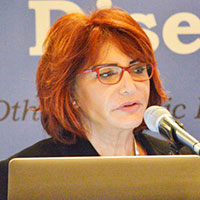Sessions and Tracks
1. Advances in Obesity Pathophysiology
This track explores the complex biological mechanisms underlying obesity, including hormonal imbalances, metabolic regulation, and adipose tissue function. It highlights recent genomic and proteomic discoveries that influence weight gain and energy expenditure. Attendees will gain insights into the interplay between inflammation, gut hormones, and metabolic pathways. By understanding these mechanisms, researchers can identify innovative therapeutic targets. The session encourages collaboration among basic scientists and clinicians. Emerging models and experimental approaches will also be discussed to advance obesity research.
2. Childhood and Adolescent Obesity
Focusing on early-life obesity, this track examines behavioral, genetic, and environmental contributors affecting children and teens. Experts will address the rise of pediatric obesity and its long-term health risks, including diabetes and cardiovascular diseases. Discussions will cover early detection strategies, community-based interventions, and school nutrition reforms. The program highlights innovative digital and clinical tools for monitoring young populations. Prevention frameworks and family-centered care models will be emphasized. Policymakers and pediatricians will benefit from actionable insights.
3. Nutrition, Dietetics & Weight Management
This track dives into evidence-based dietary approaches, nutritional guidelines, and sustainable eating habits for obesity management. Speakers will present research on macronutrient balance, caloric restriction methods, fasting protocols, and plant-based diets. Practical case studies will be shared by dietitians and clinicians. The session also highlights the role of behavioral coaching and long-term adherence strategies. Attendees will learn how personalized nutrition enhances treatment outcomes. Discussions will extend to global dietary trends and food policy initiatives.
4. Lifestyle Modifications & Behavioral Therapy
This track emphasizes behavioral interventions that support weight loss and long-term maintenance. Topics include cognitive-behavioral therapy, motivational interviewing, and stress management techniques. Experts will evaluate the psychological barriers that influence obesity and emotional eating. Attendees will explore culturally tailored programs and digital tools that enhance lifestyle changes. Strategies for community engagement and health coaching will also be addressed. The track brings together psychologists, health educators, and clinicians.
5. Genetics, Epigenetics & Obesity Risk
This track examines how genetic predisposition and epigenetic modifications contribute to obesity development. Presentations will cover genome-wide association studies, gene-environment interactions, and hereditary metabolic disorders. Researchers will discuss how lifestyle factors influence epigenetic markers over time. The track highlights the potential of precision medicine in identifying at-risk populations. Ethical considerations surrounding genetic testing will also be evaluated. It is highly beneficial for geneticists and precision health researchers.
6. Gut Microbiome & Metabolic Health
This session explores the powerful role of the gut microbiota in weight regulation, digestion, and systemic inflammation. Evidence shows that microbial imbalance can trigger obesity-related metabolic disturbances. Experts will discuss innovative microbiome-targeted therapies, including probiotics, prebiotics, and fecal microbiota transplantation. The session includes advancements in metagenomics and personalized nutrition based on microbiome profiling. Attendees will explore the gut–brain axis and its impact on appetite control. Interdisciplinary collaboration is strongly encouraged.
7. Obesity and Diabetes Interlink
This track highlights the bidirectional connection between obesity and diabetes, often referred to as "diabesity." Speakers will review insulin resistance mechanisms, pancreatic function, and metabolic syndrome components. Advances in diabetes prevention and glycemic control strategies will be presented. Clinical case studies outline effective weight-loss interventions that improve diabetic outcomes. The track also explores pharmacological innovations and digital monitoring tools. Endocrinologists, diabetologists, and obesity researchers will find it particularly insightful.
8. Bariatric Surgery & Post-Operative Care
Dedicated to surgical interventions, this track covers indications, procedures, and long-term outcomes of bariatric surgery. Surgeons and clinicians will discuss gastric bypass, sleeve gastrectomy, and novel minimally invasive techniques. The session includes patient selection criteria, perioperative protocols, and complication management. Emphasis is placed on post-surgical nutritional guidance and psychological support. Presenters will share long-term follow-up studies and metabolic improvements. Attendees will gain practical insights to improve patient care.
9. Anti-Obesity Pharmacotherapy
This track showcases advancements in weight-loss medications, including appetite suppressants, metabolic enhancers, and GLP-1–based therapies. Researchers will present clinical trial data, safety profiles, and dosing strategies. The session explores the integration of pharmacotherapy with lifestyle modifications for enhanced outcomes. Discussions include long-term efficacy, patient adherence, and emerging drug pipelines. Regulatory considerations and global approvals will be reviewed. Clinicians will benefit from updated therapeutic guidelines.
10. Cardiovascular Complications of Obesity
This track focuses on obesity’s impact on heart health, including hypertension, atherosclerosis, and heart failure. Presenters will explore pathophysiology, screening strategies, and preventive measures. Innovative treatments and risk-reduction approaches will be discussed. Case studies demonstrate the improvement of cardiac function through weight-loss interventions. Digital cardiology tools and risk stratification models will be highlighted. Cardiologists and obesity specialists will gain comprehensive clinical insights.
11. Endocrine Disorders & Hormonal Imbalance
This session reviews how endocrine dysfunction—including thyroid, adrenal, and pituitary disorders—affects obesity. Experts will highlight hormonal influences on metabolism, appetite, and fat distribution. Diagnostic approaches and endocrine-targeted therapies will be discussed. Case presentations demonstrate real-world complexities of managing hormonal obesity. Attention is given to the role of reproductive hormones, particularly in PCOS-related weight gain. Endocrinologists and clinicians will find this track highly valuable.
12. Obesity in Women’s Health
This track focuses on gender-specific challenges such as pregnancy-related weight gain, PCOS, and menopause. Speakers will discuss hormonal regulation, fertility impacts, and maternal obesity outcomes. Evidence-based interventions for pre- and post-natal care will be highlighted. The program also covers psychological and societal factors influencing women’s weight. Attendees will learn strategies to enhance long-term metabolic health in women. It promotes collaboration among gynecologists, endocrinologists, and nutrition experts.
13. Obesity and Mental Health
Emphasizing the connection between obesity and emotional well-being, this session addresses depression, anxiety, and body image disorders. Speakers will explore how psychological stress influences eating behaviors and metabolic pathways. Interventions such as psychotherapy, stress reduction, and emotional regulation techniques will be presented. The track highlights stigma reduction and patient-centered communication techniques. Researchers will also discuss neurobiological mechanisms of emotional eating. Mental health professionals and clinicians are especially encouraged to join.
14. Physical Activity, Exercise & Fitness Science
This track offers evidence-based insights into physical activity’s role in weight management. Experts will detail aerobic, resistance, and high-intensity interval training protocols. New research on exercise physiology and metabolic adaptations will be presented. Strategies to improve adherence and reduce sedentary behavior are discussed. Case examples highlight individualized exercise prescriptions. The session is ideal for fitness experts, physiologists, and healthcare practitioners.
15. Obesity & Cardiometabolic Syndrome
Addressing a major global health concern, this track covers the cluster of conditions—central obesity, dyslipidemia, hypertension, and insulin resistance. Speakers will present early detection strategies and integrated management approaches. Research on metabolic inflammation and organ dysfunction will be emphasized. Attendees will learn how lifestyle, pharmacological, and surgical interventions improve cardiometabolic health. Public health implications and cost-effective policies will be discussed. This track encourages interdisciplinary collaboration.
16. Obesity in Aging Populations
This track examines obesity among older adults, focusing on frailty, muscle loss, and metabolic decline. Experts will address diagnostic challenges and weight-management considerations in aging individuals. Presentations include tailored dietary plans, safe exercise routines, and pharmacologic considerations. The session also explores sarcopenic obesity and its long-term complications. Strategies for enhancing mobility, quality of life, and independence will be emphasized. Gerontologists and clinicians will find the discussions highly applicable.
17. Public Health Strategies & Community Interventions
This track highlights large-scale initiatives to reduce obesity at community and national levels. Speakers will present successful policy frameworks, school-based programs, and health-promotion campaigns. The session explores the impact of food labeling, sugar taxes, and urban planning on population health. Attendees will learn strategies for building community partnerships and addressing health disparities. Case studies from different countries will be shared. Ideal for policymakers and public health professionals.
18. Digital Health, Wearables & AI in Obesity Management
Focusing on technological innovations, this session covers AI-based tools, mobile apps, telehealth platforms, and smart wearables. Presenters will showcase how digital tracking enhances patient monitoring and engagement. The track includes advancements in predictive analytics and personalized care algorithms. Discussions extend to data privacy, digital literacy, and health equity. Real-world case studies illustrate improved outcomes through tech-enabled interventions. It encourages collaboration between clinicians and technologists.
19. Food Industry, Marketing & Consumer Behavior
This track analyzes how food production, marketing strategies, and consumer behavior influence obesity trends. Experts will review the impact of processed foods, portion sizes, and labeling practices. Behavioral economics and decision-making models will be explored. Attendees will learn how policy and industry reforms can promote healthier choices. The session includes discussions on culturally sensitive messaging and global food systems. It is suitable for public health leaders and food industry stakeholders.
20. Obesity & Liver Disorders (NAFLD/NASH)
This track focuses on obesity’s role in liver diseases, particularly fatty liver disorders. Presenters will discuss the pathogenesis of NAFLD and NASH, diagnostic imaging, and biomarker advances. Attendees will learn about lifestyle, pharmacologic, and surgical interventions that improve liver health. The session highlights emerging drug therapies under investigation. Multidisciplinary approaches involving hepatologists, dietitians, and metabolic specialists are emphasized. Clinical case discussions will enhance learning.
21. Obesity and Cancer Risk
This track covers the association between obesity and various cancers, including breast, colorectal, endometrial, and pancreatic. Speakers will explore underlying mechanisms such as inflammation, hormonal changes, and metabolic dysregulation. Evidence-based prevention and screening strategies will be reviewed. The session includes insights into survivorship and weight-management approaches for cancer patients. Researchers will present new findings on obesity’s role in tumor progression. It is essential for oncologists and public health professionals.
Target audience
· Researchers and scientists in obesity, metabolism, and weight-management studies
· Endocrinologists and diabetologists
· Nutritionists, dietitians, and wellness experts
· Bariatric surgeons and metabolic surgery specialists
· Pediatric and adolescent health professionals
· Public health officers and policymakers
· Healthcare practitioners, clinicians, and general physicians
· Fitness trainers, physiotherapists, and lifestyle coaches
· Pharmaceutical, biotech, and medical device industry professionals
· Obesity prevention and community health program coordinators
· Academic professionals, professors, and university students
· Mental health experts working on eating disorders and behavioral health
· Hospital administrators and healthcare decision-makers
· NGOs and associations focused on obesity, diabetes, and nutrition
· Startups and innovators in digital health, weight-loss tech, and AI health solutions











